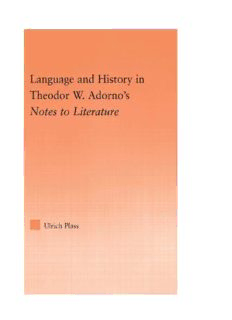Table Of ContentStudies in Philosophy
Edited by
Robert Bernasconi
University of Memphis
A Routledge Series
Studies in Philosophy
Robert Bernasconi, General Editor
Essays on Symmetry Referential Opacity and Modal Logic
Jenann Ismael Dagfinn Føllesdal
Descartes’ Metaphysical Reasoning Emmanuel Levinas
Roger Florka Ethics, Justice, and the Human beyond Being
Elisabeth Louise Thomas
Essays on Linguistic Context Sensitivity
and Its Philosophical Significance The Constitution of Consciousness
Steven Gross A Study in Analytic Phenomenology
Wolfgang Huemer
Names and Nature in Plato’s Cratylus
Rachel Barney Dialectics of the Body
Corporeality in the Philosophy of T. W. Adorno
Reality and Impenetrability in Kant’s Lisa Yun Lee
Philosophy of Nature
Daniel Warren Art as Abstract Machine
Ontology and Aesthetics in Deleuze and
Frege and the Logic of Sense and Guattari
Reference Stephen Zepke
Kevin C. Klement
The German Gt
Topics in the Philosophy of Possible Hermeneutics and Discipline in the German
Worlds Reception of Indian Thought, 1778–1831
Daniel Patrick Nolan Bradley L. Herling
Understanding the Many Hegel’s Critique of Essence
Byeong-uk Yi A Reading of the Wesenslogik
Franco Cirulli
Anthropic Bias
Observation Selection Effects Time, Space and Ethics in the Philosophy
Nick Bostrom of Watsuji Tetsur, Kuki Shz, and
Martin Heidegger
The Beautiful Shape of the Good Graham Mayeda
Platonic and Pythagorean Themes in Kant’s
Critique of the Power of Judgment Wittgenstein’s Novels
Mihaela C. Fistioc Martin Klebes
Mathematics in Kant’s Critical Language and History in Theodor W.
Philosophy Adorno’s Notes to Literature
Reflections on Mathematical Practice Ulrich Plass
Lisa Shabel
Language and History in Theodor W.
Adorno’s Notes to Literature
Ulrich Plass
Routledge
New York & London
Excerpts from Theodor W. Adorno, Aesthetic Theory, edited by Gretel Adorno and Rolf Tiedemann, newly
translated and edited by Robert Hullot-Kentor. English translation copyright (c) 1997 by the Regents of the
University of Minnesota. Original German-language edition copyright 1970 by Suhrkamp Verlag. Used
by permission.
Excerpts from Theodor W. Adorno and Max Horkheimer, translated by Edmund Jephcott, Dialectic of
Enlightenment. Copyright (c) 1944 by Social Studies Association, NY. New edition: (c) S. Fischer Verlag
GmbH, Frankfurt am Main, 1969; English trans. (c) 2002 Board of Trustees of Leland Stanford Jr. Univer-
sity. All rights reserved. Used by permission of Stanford University Press.
Excerpts from Theodor W. Adorno, Notes to Literature, vols. 1 and 2, edited by Rolf Tiedemann, translated
by Sherry Weber Nicholsen. English language copyright (c) 1991 and 1992 by Columbia University Press.
Used by permission.
Excerpts from Theodor W. Adorno, Prisms, translated by Sam and Sherry Weber. English language copy-
right (c) 1967 by Theodor W. Adorno / The MIT Press. Used by permission.
Excerpt from The Works of Stefan George, translated by Olga Marx and Ernst Morwitz. Copyright (c) 1949
by The University of North Carolina. Used by permission.
Routledge Routledge
Taylor & Francis Group Taylor & Francis Group
270 Madison Avenue 2 Park Square
New York, NY 10016 Milton Park, Abingdon
Oxon OX14 4RN
© 2007 by Taylor & Francis Group, LLC
Routledge is an imprint of Taylor & Francis Group, an Informa business
Printed in the United States of America on acid-free paper
10 9 8 7 6 5 4 3 2 1
International Standard Book Number-10: 0-415-97837-8 (Hardcover)
International Standard Book Number-13: 978-0-415-97837-8 (Hardcover)
No part of this book may be reprinted, reproduced, transmitted, or utilized in any form by any electronic,
mechanical, or other means, now known or hereafter invented, including photocopying, microfilming,
and recording, or in any information storage or retrieval system, without written permission from the
publishers.
Trademark Notice: Product or corporate names may be trademarks or registered trademarks, and are
used only for identification and explanation without intent to infringe.
Library of Congress Cataloging-in-Publication Data
Plass, Ulrich.
Language and history in Theodor W. Adorno’s notes to literature / Ulrich Plass.
p. cm. -- (Studies in philosophy)
Includes bibliographical references and index.
ISBN 0-415-97837-8 (alk. paper)
1. Adorno, Theodor W., 1903-1969. Noten zur Literatur. 2. Literature--History and
criticism. I. Title.
PN514.A337 1974
809--dc22 2006021522
Visit the Taylor & Francis Web site at
http://www.taylorandfrancis.com
and the Routledge Web site at
http://www.routledge-ny.com
For Suzanne
Contents
List of Abbreviations ix
Note on Translations xi
Acknowledgments xiii
Preface xv
Introduction
Adorno’s Literary Criticism xxi
Chapter One
The Art of Transition 1
Chapter Two
Rauschen: Eichendorff 49
Chapter Three
Conjuration: Rudolf Borchardt 73
Chapter Four
As If: Stefan George 89
Chapter Five
The Wound: Heine 115
Chapter Six
Exhaustion: Goethe 153
vii
viii Contents
Conclusion 175
Notes 179
Bibliography 225
Index 243
List of Abbreviations
WORKS BY THEODOR W. ADORNO:
In German:
BG: Beethoven: Philosophie der Musik
GS: Gesammelte Schriften
PT: Philosophische Terminologie
In English:
AP: “The Actuality of Philosophy”
AT: Aesthetic Theory
BE: Beethoven: The Philosophy of Music
CM: Critical Models: Interventions and Catchwords
DE: Dialectic of Enlightenment
HS: Hegel: Three Studies
JA: The Jargon of Authenticity
K: Kierkegaard: Construction of the Aesthetic
MM: Minima Moralia
ND: Negative Dialectics
NH: “The Idea of Natural History”
NL: Notes to Literature
WORKS BY ADORNO AND WALTER BENJAMIN:
BW: Briefwechsel 1928-1940
CC: The Complete Correspondence 1928-1940
ix
Description:Plass argues that Adorno’s essays on literature are of prime importance for an understanding of his aesthetics because they challenge the conceptual limitations of philosophical discourse.

